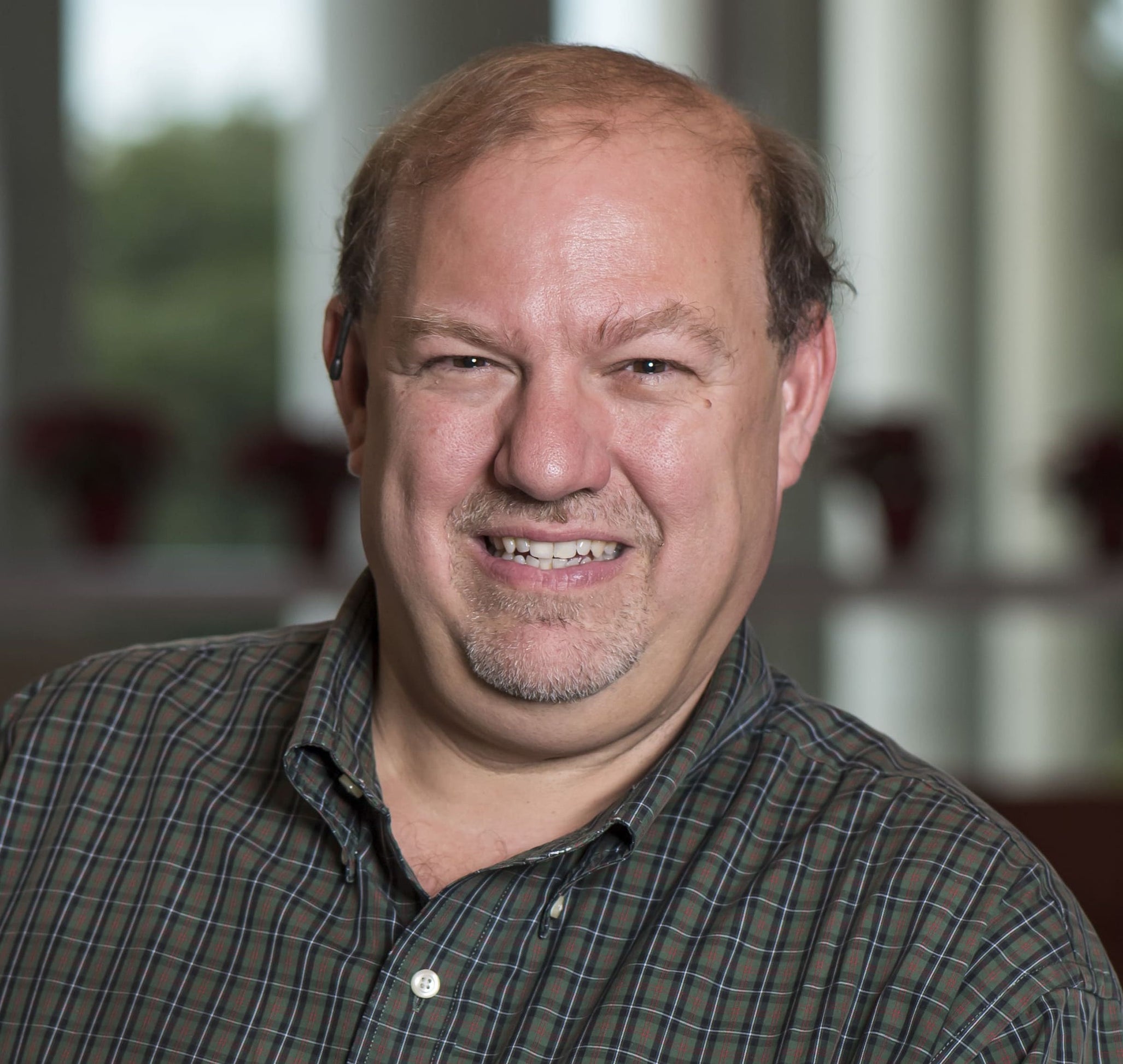The Ken Kennedy Institute's February Member of the Month: Robert Raphael, Associate Professor of Bioengineering.
Robert Raphael applies engineering principles to understand the auditory and vestibular system and develop strategies to fight hearing loss and vestibular dysfunction. With support from the NIH, Raphael's lab recently developed a computational model that uncovered the mechanism of electrical transmission between vestibular hair cells and afferent neurons (https://news.rice.edu/news/2023/inner-ear-has-need-speed). His lab is currently funded by the Hearing Health Foundation to develop optical coherence tomography methods to image the inner ear. Additionally, Raphael was the PI of an NSF IGERT which catalyzed the development of Neuroengineering at Rice.
Raphael has had to overcome dominant-progressive hearing loss and received a cochlear implant in 2013. Over the years he has been active in mentoring students with hearing loss, and is the co-PI of a recently awarded NIH R25 called STEMM-HEAR, which will support research opportunities for undergraduates with hearing loss.
How would you explain your research in 1-2 sentences?
Relevant to the Ken Kennedy Institute, my group builds biophysically-detailed computational models to understand biological circuitry responsible for our sense of hearing and balance, including how mechanical signals detected by receptor cells are transformed into patterns of neural excitation. These models give insight into the normal operation of the auditory and vestibular system, uncover how genetic mutations cause dysfunction, and guide the design of auditory and vestibular implants.
How does your work impact the community at large?
Inner ear diseases are an increasing challenge to public health: hearing loss affects 48 million Americans and 1.5 billion people worldwide, approximately 615,000 Americans are diagnosed with Meniere’s disease (which causes episodes of vertigo), and approximately 1/3 of adults over age 65 fall each year. Often there is little clinicians can do to treat these issues. Inner ear research is a small field and dominated by experimentalists, and so we are serving the research community by building integrated models that guide the design of experiments. Our hope is that our modeling efforts will lead to better understanding of the causes of these conditions and inspire therapeutic interventions.
What kind of collaborations are you looking for at Rice and within the community?
I am very interested in collaborating with other researchers with expertise in machine learning, bioinformatics, fluid mechanics, optimization and computational biology. As my group builds more detailed models of multiple sensory hair cells and neurons, we will need to employ high-performance computing. One of my dreams has been to build a multidisciplinary Center for Hearing and Balance in Houston, which will span the gamut from basic research to clinical translation and address equity and disparities in auditory and vestibular rehabilitation.
How do you see computation and data advancing in the future?
Biological systems are complicated; modeling and computation are necessary to gain an understanding of how biological processes operate. In the past decade we have seen an explosion of technologies at all levels for collecting large amounts of biological data: high-throughput genomics and proteomics, high-density neural recordings and highly detailed structures of biological molecules. The need for computational techniques to analyze and understand these massive datasets has never been greater. At the same time we are beginning to realize the importance of personalized medicine due to the unique genetic make-up of individuals. So, computation and data science are going to transform healthcare.
How do you see the Ken Kennedy Institute supporting you and/or your research?
I have enjoyed attending the Ken Kennedy Institute conference on AI and Data Science (now AI in Health Conference) over the past few years. The Institute’s breakfasts and luncheons have allowed me to network and meet the excellent new young researchers Rice has recruited recently. Santiago Segarra and I developed a fantastic collaboration to create a graph signal processing model of the cochlea. Together we had a postdoc on Dr. Kavraki's NIH NLM Training Grant in Biomedical Informatics and Data Science. I look forward to future opportunities to apply for seed funding from the Ken Kennedy Institute as we develop new collaborations.
What is your favorite book or movie?
Among my favorite books are the "Dialogues of Plato" and "Man's Search for Meaning."
The Dialogues exemplify the Socratic Method which I use in teaching. Socrates is constantly challenging us to ask questions, especially questions that move us out of our comfort zone. In “Man’s Search for Meaning," Victor Frankl teaches us how to will meaning into our lives.
One of my favorite movies is "Life is Beautiful” and my favorite TV series is “The Sopranos,” which reminds me of my Sicilian-American family.
Do you have any words of inspiration you would like to share?
I often get inspiration from the Greek philosophers, including Socrates and Marcus Aurelius.
Marcus Aurelius exorts: “When you arise in the morning, think of what a precious privilege it is to be alive - to breathe, to think, to enjoy, to love."
One of my favorite quotes from Socrates is: “I shall never cease from the practice and teaching of philosophy, exhorting anyone whom I meet after my manner, and convincing him, saying: O my friend, why do you who are a citizen of the great and mighty and wise city of Athens, care so much about laying up the greatest amount of money and honor and reputation, and so little about wisdom and truth and the greatest improvement of the soul."
I like a lot of the leadership quotes from General Patton, including “Never tell people how to do things. Tell them what to do and let them surprise you with their ingenuity.” I use this to approach to train my graduate students, because it forces them to think creatively, and learning to think independently is one of the most important things we can teach them.
_
See Rob's Rice Profile here.

